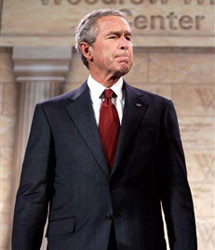 |
 |
 |
 News from Around the Americas | December 2005 News from Around the Americas | December 2005  
Bush Caves on Torture Policy
 Arthur H. Rotstein - Associated Press Arthur H. Rotstein - Associated Press


| | President Bush again vowed the United States will stay in Iraq "until victory is achieved," and defended his decision to go to war amid a drumbeat of criticism from Democrats who say Bush does not have a plan on Iraq. (Photo: Kevin Lamarque / Reuters) |
Washington - The White House, after weeks of resistance, agreed today to Senator John McCain's call for a law specifically banning cruel or inhuman treatment of terror suspects anywhere in the world.

Mr. McCain met with President Bush at the White House this afternoon, and an announcement of a deal followed.

The president said that the agreement would "make it clear to the world that this government does not torture and that we adhere to the international convention of torture, whether it be here at home or abroad."

Mr. McCain said that "we've sent a message to the world that the United States is not like the terrorists."

He continued, "This will help us enormously in winning the war for the hearts and minds of people throughout the world in the war on terror."

Under the agreement, interrogators for the Central Intelligence Agency would be granted the right - already extended to members of the military - to defend themselves from charges of abuse by saying that a reasonable person would believe that they were obeying a legal order. The protection of C.I.A. interrogators had been a key objective of Vice President Dick Cheney.

But the agreement remained controversial. Representative Duncan Hunter, Republican of California and chairman of the House Armed Services Committee, quickly announced his opposition, saying he might try to block the accord unless clearer protections for interrogators were spelled out.

This was the second time in less than 24 hours that Congressional concerns about torture - and the damage to America's image wrought by allegations of secret C.I.A. detentions and interrogations - had overwhelmed the Bush administration's intent on keeping an array of tools to wage a difficult, high-stakes battle against terrorism.

Late Wednesday, in a rare bipartisan rebuke to the administration, the House of Representatives voted, 308 to 122, to endorse the McCain language barring cruel, inhumane or degrading treatment of prisoners in American custody anywhere in the world.

That vote was nonbinding. But with 107 Republican legislators joining Democrats in support of the measure - introduced by Representative John Murtha, Democrat of Pennsylvania, who recently made a high-profile call for an early withdrawal from Iraq - it doubtless added to the pressure on the White House.

The political clout of Mr. McCain - he was a presidential candidate in 2000 - and his past as a former naval aviator who was tortured in Hanoi during the Vietnam War have given his determined stance against torture particular resonance in Congress.

While details of the agreement remained uncertain, it appeared that the tremendous global outcry over allegations of secret prisoner transfers and interrogations, and its increasingly powerful echoes in Congress, had succeeded in bending the administration to compromise.

The agreement also appeared likely to give greater legal foundation to remarks made earlier this month in Europe by Secretary of State Condoleezza Rice, who faced enormous pressure over allegations of secret CIA detention camps and transfers.

She said the United States would not take part in torture on its own territory or overseas. But her seemingly carefully crafted comments during that trip gave rise to sharp debate over whether they left any loopholes.

Mr. McCain has met repeatedly in recent weeks with the national security adviser, Stephen Hadley, to negotiate a solution to the tensions over torture.

A key sticking point has been whether an agreement would equally cover all branches of government - including the military, the CIA, and also government contractors.

Vice President Cheney had made an unusual appeal to Republican senators to provide an exemption for the CIA. The White House even threatened to veto the sweeping military-spending bill to which the Senate version of Mr. McCain's amendment was attached. The House version omitted those provisions from its version of the $453 billion spending bill.

Mr. McCain's language proved difficult for lawmakers to oppose, particularly at a time when opinion polls show that torture and detainee issues have seriously eroded the United States image abroad.

Reports of abuses at Abu Ghraib prison near Baghdad, and allegations of misconduct by troops at the American detention center at Guantánamo Bay, Cuba, had fueled the push for more precise ban on torture.

Throughout the debate, the White House has insisted that the United States does not engage in torture. | 
 | |
 |



